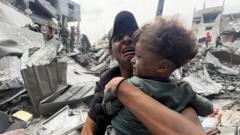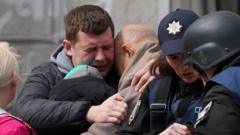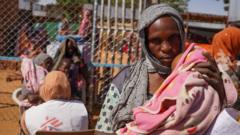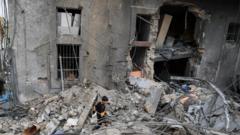The latest Israeli airstrike has resulted in significant casualties and has intensified calls for urgent humanitarian action as fears of a prolonged conflict grow.
Israeli Airstrike in Gaza Leaves 29 Dead, Humanitarian Crisis Escalates

Israeli Airstrike in Gaza Leaves 29 Dead, Humanitarian Crisis Escalates
A deadly strike on Gaza's Shejaiya neighborhood exacerbates the ongoing humanitarian disaster.
At least 29 Palestinians were reported killed, including eight children, following an Israeli airstrike on a residential building in Gaza City's Shejaiya neighborhood on Tuesday morning, according to medical sources in the area. The Hamas-operated Civil Defence agency stated that warplanes targeted the vicinity of al-Hawashi mosque, resulting in more than 60 injuries and ongoing rescue efforts to retrieve individuals trapped under the wreckage.
The Israeli military defended the attack, claiming it was aimed at eliminating a "senior Hamas terrorist" linked to previous assaults. They emphasized efforts were made to minimize civilian casualties, asserting the use of "precision weapons." The military further accused Hamas of breaching international laws by employing civilians as human shields.
Eyewitness accounts paint a grim picture of the aftermath, with one local describing the scene as "a horrific massacre" following a barrage of missiles that unleashed chaos and debris. As thousands fled earlier evacuations ordered by Israel, the situation remains dire.
In a troubling escalation, Gaza's health ministry reported that the recent bombardments brought the death toll to 1,482 since military operations resumed on March 18. The ongoing displacement crisis has now reached 390,000 people, while two-thirds of Gaza has been declared "no-go" zones by Israeli authorities.
Compounding the humanitarian crisis, the United Nations has raised alarms over a dire shortage of food, medicine, and fuel due to a month-long blockade imposed by Israel, which has impeded humanitarian aid deliveries. Secretary-General António Guterres condemned this blockade, calling it a violation of international law that has led to widespread suffering among civilians.
In contrast, the Israeli government refuted claims of aid shortages, stating that over 25,000 aid trucks have entered Gaza during the 42 days of ceasefire, accusing Hamas of misusing the aid for military purposes.
Pressure mounts as heads of six UN humanitarian agencies criticized Israel's claims regarding food sufficiency for Gaza's population, urging for immediate protective measures for civilians, aid access, and the release of hostages held by Hamas.
Dialogue continues in efforts to revive the ceasefire, previously established on January 19. Israel opted to recommence its offensives after Hamas rejected further ceasefire extensions and hostage negotiations, further intensifying the ongoing conflict initiated by the unprecedented attacks launched by Hamas on October 7, resulting in substantial fatalities and hostage situations.
As humanitarian concerns deepen, the international community remains on edge, anticipating further developments in the Israel-Gaza crisis.


















